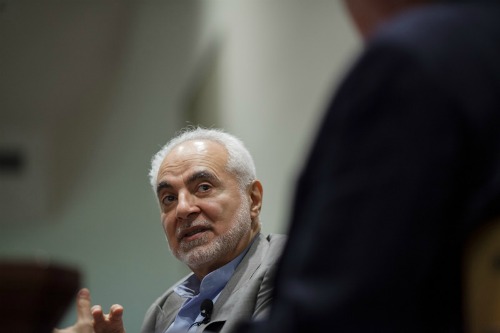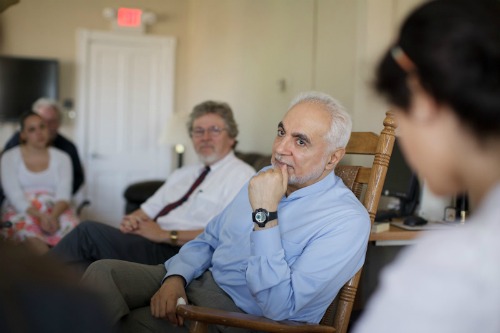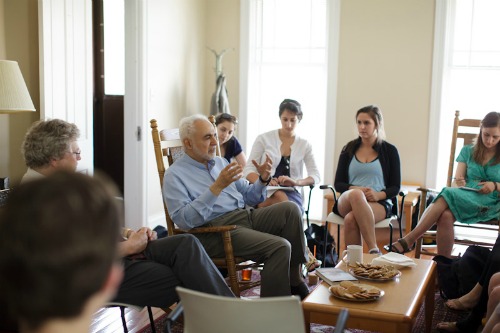Imam discusses evolution of ‘American Islamic identity’
In much the same way that Catholics and Jews had to overcome prejudice and fear to gain acceptance in the United States, Muslims from around the world who come to America are on a journey to develop “an American Islamic identity,” Imam Feisal Abdul Rauf told an audience of students, faculty and members of the community Monday night.
“From my study of religion, I’ve observed that when religions move from their founding culture to different environments, they evolve,” said Rauf, founder of the Cordoba Institute, which seeks to build bridges between Muslims and American society and resolve conflicts between Islam and the West. “It winds up adapting itself to a different culture, and adopts that different culture and expresses itself in that different culture.”
When Catholics and Jews first came to America, “they went through what we’re going through today in terms of rejection by the community,” said Rauf, who stayed after his talk to sign copies of his new book Moving the Mountain: Beyond Ground Zero to a New Vision of Islam in America. “They were looked at as trying to destroy the American way.”
He cited the example of John F. Kennedy, who became the first Catholic president of the United States in 1960 after enduring attacks that “he was going to be an agent of the pope and the Catholic Church.”
“What happened was, in each of those cases, an American Catholic identity emerged, an American Jewish identity emerged. The same thing is happening in the Islamic community, whether we know it or not,” Rauf said. “By understanding the history of not only our own tradition, but also of faith movements as they find their American legs and own identity, we can very confidently predict that Muslims also are on the journey of developing or evolving an American Islamic identity.”
‘An unshakeable foundation’
Rauf, who was named by TIME magazine as one of the 100 most influential people in the world last year, became embroiled in the controversy that erupted in 2010 over the proposed construction of an Islamic center near Ground Zero—the site of the 9-11 terrorist attacks that killed more than 3,000 people and brought down the two towers of the World Trade Center in lower Manhattan. He was originally scheduled to speak at Lehigh last October, but the event was postponed due to the freak snowstorm that caused massive power outages and closed Lehigh for three days.
He arrived on campus Monday to an unseasonably warm day, and met with a group of about a dozen students—several of whom recently took part over Spring Break on a trip to Jerusalem with Lloyd Steffen, professor of religion studies and university chaplain—in the Dialogue Center before engaging in an hour-long conversation with Steffen on the stage of Packard Auditorium.
Rauf, a Sufi Muslim, considered Islam’s most mystical denomination, has long been a passionate advocate for interfaith dialogue. In response to a question from Steffen about his faith, he replied: “I think every religion must be practiced from an experiential base. Because if you practice religion as an individual, from your own experience of God, then your religion is based on an unshakeable foundation, the right foundation. It’s literally what I call from the inside-out. It’s comfortable, and strong and firm and prepared to deal with the trials and tests that every person experiences.
“But if you try to practice your religion from the outside-in, as many of us do, your religion is not really genuine. Because religion becomes kind of a cultural identity, rather than based upon the experience of God.”
Rauf’s appearance was sponsored by the Visiting Lectures Committee, the Center for Dialogue, Ethics and Spirituality, the Office of International Affairs, and the Globalization and Social Change Initiative.
Photos by Theo Anderson
Posted on:




